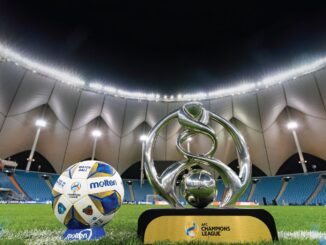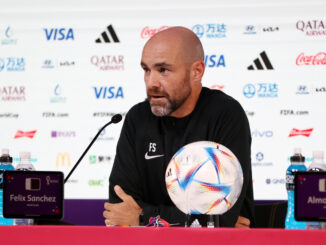
Away from the transfer whirlwind that’s starting to spin in Saudi Arabia, attention across Asia will focus on international football this week as the very best in Asia bed down their preparations in the run up to a new World Cup qualification campaign and upcoming Asian Cup challenge.
With the continental showpiece only six months away the arrangements for those looking for silverware in Qatar couldn’t be more different.
The long awaited inaugural CAFA Nations Cup has finally arrived, with excitement and progress to be had on the pitch, in the stands and in the corridors of power in Uzbekistan and Kyrgyzstan.
Elsewhere, with Saudi Arabia and United Arab Emirates sitting out the June international window as they reconsider their next managerial appointments, their competition are looking at re-evaluating their respective squads with the emergence of what we can expect from this 2026 generation or in the case of the upcoming hosts, a psychological escape from the disappointment of 2022.
The inaugural Central Asian football championships open in optimistic mood
A tournament that has been years in the musing, the inaugural senior Central Asian football championship finally makes its first appearance on the international scene.
With concerns that this may only be a one-time thing, with some already questioning the funding and feasibility of a follow up in years to come, for now Central Asian fans will be excited to witness what most parts of Asia take for granted – a regional showpiece.
It’s difficult to foresee a better time for it to take place, with Central Asia rising in standard year on year, with four of the association set to take part in the upcoming Asian Cup, alongside significant improvements made in club football.
The well speculated origins of this tournament may have stemmed from Central Asia’s neighbouring cousins Russia having shown brief interest in Asian football six months ago, but thankfully the region can fall back on a football scene that is growing from strength to strength, both on the pitch and off it, with suggestions Central Asia may unite in bidding to host the Asian Cup in 2031.
Hosting for this tournament will be shared between Uzbekistan and Kyrgyzstan, with the final rounds taking place in Tashkent. The Uzbeks personify the growing professionalism and vision of the region; demonstrated in their repeated success in youth football and their mature growth under current national team coach Srecko Katanec.
While the upcoming Asian Cup may come too soon for many of their blossoming young talent, those who are already in the senior fold will be already looking towards a place at the World Cup in three years’ time as a growingly realistic ambition.
With that, a full-strength squad looks set to contest for the region’s first ever title; spearheaded by their talisman Eldor Shomurodov, who may have suffered for form and minutes in Italy but has continued to rack up the goals on the international scene with Uzbekistan.
Kyrgyzstan are likely to have reduced hopes of silverware, with new coach Stefan Tarkovic instead prioritising a steady rebuild over an instant bounce back following an abrupt end to former coach Aleksandr Krestinin’s decade long reign.
The highlight of their upcoming campaign was supposed to be the debut of Joel Kojo, who was successfully nationalised as a Kyrgyz citizen over the last six months. Concerns that his club side, Dinamo Samarkand in Uzbekistan wouldn’y release him for the group stage may curtail his appearances back in his adopted homeland, at least initially, having promised to be the catalyst behind Tarkovic’s immediate bounce.
If it isn’t Uzbekistan’s crown, Iran are likely to contend them for it.
Amir Gholenoei’s second squad selection since he was appointed as Carlos Queiroz’s successor at the turn of the year could see him find immediate success. Outside the usual heavyweights, the inclusion of Mehdi Ghayedi and Belgian based Amirhossein Hosseinzadeh adds some forward-looking interest to the very immediate focus of clinching the CAFA title.
Elsewhere there’s a mixture of hope, fear and uncertainty for the rest of the tournament. Tajikistan arrive in good form and momentum under the eccentric Petar Segrt, while Turkmenistan are a little less bullish, under new coach Mergen Orazov, who’s club side and reigning Turkmen champions Ahal, that make up much of his squad, are currently on a seven-match losing streak. It could either be a case of more pain, or potentially a welcome distraction.
Afghanistan feel similarly uneasy under their first new coach in five years with the arrival of former Nepal coach Abdullah Al-Mutairi, while Oman make up the numbers as one of two invitees spots the CAFA failed to fill.
Branko Ivankovic’s side have made a habit of being the surprise package following their giant killing shocks in World Cup qualification and the Gulf Cup at the start of the year. Could they spoil the Central Asian party in Tashkent?
All eyes on the new additions as Asia’s best host South America (again)
Since the advent of Nations League competitions in Europe and North America, going hand in hand with Asia’s preference to host rather than guest in international friendly windows, the ever-predictable sight of South America’s finest heading for a continental friendly payday will once again play out this coming week.
While there’s a temptation to become blasé with these quite familiar matchups, this month does offer some extra interest from the usual soulless dead rubbers between the two continents, headlined by the visit of the newly crowned world champions Argentina.
Heading to Asia to face Indonesia in Jakarta next week, a parting gift in bailing out their hosts’ plans of staging the U20 World Cup earlier this month, Argentina, with Lionel Messi promised to be in toe, will first head to China for a rematch with Australia, the side they edged past in the Round of 16 on their way to World Cup glory back in December.
Aside from the political inferences generated from Australia’s appearance in Beijing, instead of a Chinese national team who’ll face more modest opposition in Myanmar and Palestine in Dalian this coming week, the yardstick of facing Argentina six months after their last encounter will be an interesting starter on the road to what should be a title chasing Asian Cup for the 2015 champions.
In terms of personnel, this Socceroos squad is a distinct change from the one Graham Arnold selected ahead of Qatar. There’s no place for much of the senior structure that has propped up their successes over the last 18 months. There’s no Aziz Behich, Jackson Irvine, Aaron Mooy or Awer Mabil and the squad is much fresher for it, with 16 of the 23 being under 25 years of age.
There’s also a sense of momentum from the assembly, with much of this squad either recently moving or finding success in Europe, something that seemed to have been trailing off only a few years back.
The eagerness to assess the progress of the likes of Jordan Bos, ahead of his move to Belgium, or the continued progress of now omnipresent centre back partnership Harry Souttar and Kyle Rowles, brings with it hope rather than fear from the Aussies travelling out to Beijing to take in the start of their Road to 2026.
There’s similar freshness on show over in Japan too, as Hajime Moriyasu proves that his squad rotation in March was no one off, continuing to overlook some of the outgoing generation in favour of youth and more new faces, including three potential debutants in the form of Ryoya Morishita, Takumu Kawamura and Sota Kawasaki.
Japanese fans instead will probably pay more attention to those that are returning to the Samurai Blue fold, as Celtic’s Reo Hatate finally earns a recall after some impressive work domestically, while Kosuke Nakamura is in line for a first cap in four years having once been thought of as the solution to Japan’s ongoing goalkeeping conundrum.
Moriyasu’s eventual experimentation has been a long time coming, yet neighbours South Korea, who’ll share hosting of El Salvador and Peru with their East Asian rivals, have arguably jumped earlier, with Jurgen Klinsmann demonstrating an eagerness to rotate his squad in only his second full international in charge.
After a carbon copy squad selection in March to that of his predecessor, Klinsmann has looked to rest more of his established stars, most notably Serie A defender of the year Kim Min-jae, who infamously spoke out on his mental and physical state last window, in place of some new and returning faces.
The defence looks to be the most interesting area of assessment, with three of Korea’s regular back four from Qatar having been given the week off. Coinciding with Korea’s success in Argentina at the U20 World Cup, where centre back duo Kim Ji-soo and Choi Seok-hyeon have been gaining significant acclaim, two alternative names will be given their chance to become Kim Min-jae’s long-term defensive partner.
Strong form in Portugal has seen the recall of Park Ji-soo, after his World Cup squad snub, while promising Seoul youngster Kim Ju-sung is expected to get at least one start alongside him.
The other headline making selection is that of Son Jun-ho, a symbolic call up in many ways, given the midfielder is still in detention in China, as a suspect within one of many bribery cases shaking Chinese football at the moment.
While Klinsmann may be without Son this coming week, he’ll undoubtedly relish the first chance to move away from Paulo Bento’s long shadow.
Qatar look to put disappointment behind them on their return to the Gold Cup
Twelve months ago, Qatar’s World Cup preparations, in a low-key training base in Marbella, Spain hit a snag, with a narrow defeat to Northern Irish domestic side Linfield, a result that raised eyebrows across the world. The promise that accompanied an Asian Cup victory only three years before, started to suggest it may not be all as it seems.
Back to this June, we now know that it was an early warning sign. The weakest World Cup campaign ever achieved by a host nation will be a tag Qatari football will struggle to shrug off for some time.
The subsequent failure at regional (an early slump in January’s Gulf Cup), youth (an infamous 9-1 defeat to Australia at the U20 Asian Cup), and club (Qatari champions Al-Duhail thumped 7-0 by Al-Hilal in the AFC Champions League semi-finals) level over the last few months echoed concerns that the Qatari bubble, once seen as the future direction of Asian football, had well and truly burst.
The transition from failure to hope is now affixed around one man – Carlos Queiroz.
The Portuguese coach, imperious during his time at Iran, has been set the unenviable task of inflating expectations and confidence, ahead of a new World Cup qualification cycle, and a home Asian Cup they still hold outside hopes of retaining at the start of 2024.
Queiroz’s first task, having wisely stayed quiet in March’s international window while he evaluated his admittedly modest player reserves, is no subdued testing ground however. A return trip, as an invited guest, at North America’s Gold Cup over the coming month is a very public arena to conduct some very difficult assessments.
It doesn’t help that expectations, at least in that part of the world are relatively high, with Qatar having made the final four only two years ago, pushing eventual champions USA into an 86th minute winner in Austin, Texas.
Individually, the players bolstered their names in kind. Almoez Ali, 18 months ahead of his meagre showing at the World Cup, was performing at his very best, clinching a second continental Golden Boot trophy following his 2019 achievement in Asia. With his strike partner Akram Afif joined him in the team of the tournament, it goes without saying Qatar made a positive impact.
This time around, any sense of optimism feels a little more subdued. The mental and physical toll of years of preparation followed by spectacular failure is borne out in the heavily rotated squad at Queiroz’s disposal.
Seven of their spine, including the aforementioned Afif, have been left out at request of the club sides involved; a well needed mental separation ahead of another relentless cycle that starts in a couple of months.
Almoez Ali remains as one of the few to survive the significant rotation. He’ll instead lead a younger, fresher, less tainted side who are billed as the next generation, to qualify for their first World Cup outright.
Qatari eyes will be fixed on defensive duo Jassem Jaber and Youssef Ayman, following their impressive domestic breakout campaigns, while a lot of hope is affixed on the shoulders of Tamim Mansour, following his brief but monumental impact at January’s Gulf Cup.
Generating confidence with a selection of fresh faces isn’t the toughest job per se, but when you’re attempting to redefine an approach at the same time, so far from what has gone before, that might be where this Qatari side comes undone.
From an attacking, fluid approach so ruthlessly instilled by Felix Sanchez over the last decade, Queiroz is expected to revert to type and bring to the fore a more cautious, pragmatic and direct style that has brought him success in the past.
With a tough group on their hands, including continental giants Mexico, the coming month offers a steep challenge to immediately bounce back to competitive and high-level football for Qatar.
As we’ve observed over the last five years, which Qatar appears in front of this challenge is anyone’s guess, but under the American glare, one thing’s for sure, there will be nowhere to hide.
Listen to the latest episode of The Asian Game Podcast




